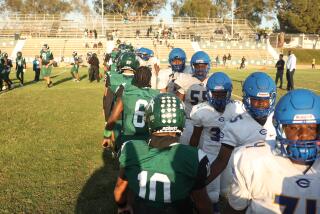School: Crenshaw’s Policy on Tardiness
- Share via
Have the parents of students at Crenshaw High who are protesting the school’s policy on tardiness and absence considered that such behavior is rude and inconsiderate to both the teacher and the other students in the class? (“Angry Over Absences,” June 5).
This kind of behavior, if not corrected in high school, is liable to continue when the student gets a job--and it certainly continues (with negative effects) if that student goes on to places of higher education.
As a community college teacher, I can attest to the fact that such conduct is widespread. At this level, students who are in school to learn become indignant when others casually stroll into class five to 15 minutes late, and interrupt with impunity whatever activity is underway. Occasional tardiness or absence is understandable, but habitual tardiness or absence should be corrected before the young adults come to believe it is acceptable behavior.
EDYTHE M. McGOVERN
Los Angeles
*
As an educator in the Los Angeles Unified School District, I have plenty of experience dealing with tardy students. The litigants described in “Angry Over Absences” don’t understand the impact that chronically late students have on the educational process. Students who arrive 10 or 20 minutes after the beginning of class disrupt learning in several ways. When they arrive late to class, the students who arrived on time are distracted from the lesson:. I must stop teaching and change tardy student’ status in my roll book. Eventually, I’ll have to reiterate material to tardy students covered before their arrival which reduces the amount of time I have to present new information to the responsible majority of the class. The bottom line: Youngsters lose hours of instructional time over the course of an academic school year because of those irresponsible students who arrive late.
Additionally, the parents’ attorney (Phillip Higgins) states that “black kids are disproportionately suffering” as a result of Crenshaw High School’s tardy policy. Such policies must be enforced regardless of race or ethnicity and not because too many students from a particular group get in trouble. Have Mr. Higgins and his clients forgotten that black students are among those losing a small piece of their collective education every time a teacher must stop to deal with a tardy student? Has he forgotten that young people learn to be responsible through the enforcement of rules? Has Mr. Higgins forgotten how consequences for failing to comply with rules contributes to personal growth as students learn which behaviors are unacceptable? Jacinto Rhines, Alexis Watson and Phillip Higgins, may I suggest that you use your energy to fight “real” injustice instead of interfering with a school system that is desperately trying to educate and socialize your youngsters?
ELLIOT STILLMAN
Venice
More to Read
Sign up for Essential California
The most important California stories and recommendations in your inbox every morning.
You may occasionally receive promotional content from the Los Angeles Times.













